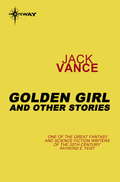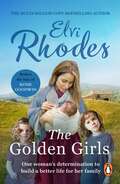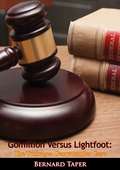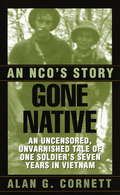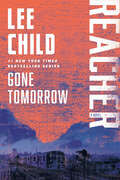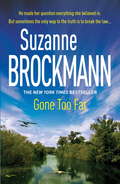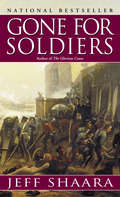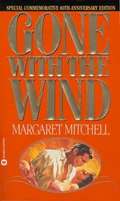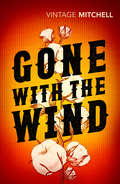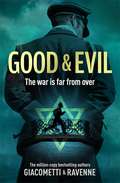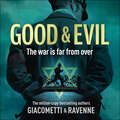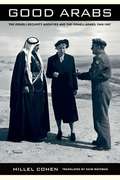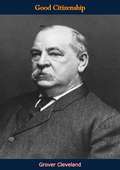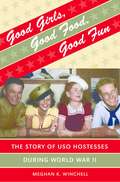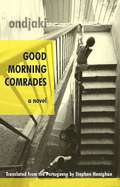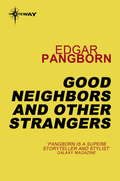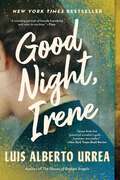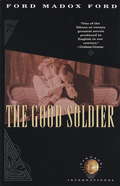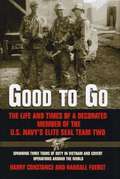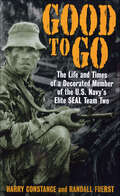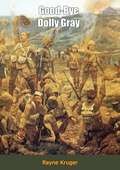- Table View
- List View
Golden Girl and Other Stories
by Jack VanceA collection of some of Jack Vance's best short fiction, containing:Golden GirlMasquerade on DicantropusAbercrombie StationCholwell's ChickensThe MitrThe World BetweenWhen the Five Moons RiseMeet Miss UniverseThe Insufferable Red-headed Daughter of Commander Tynnott, O.T.E.
Golden Girls: a compelling and emotional Yorkshire saga from multi-million copy seller Elvi Rhodes
by Elvi RhodesPerfect for fans of Kitty Neale, Rosie Goodwin and Dilly Court, this is a heartfelt novel of one woman's will to find her way in life by multi-million copy seller Elvi Rhodes. Perfect to settle down with!READERS ARE LOVING THE GOLDEN GIRLS!'Brilliant book by a great author. Loved every bit of it' -- ***** Reader review'Could not put it down' -- ***** Reader review'I enjoyed every minute' -- ***** Reader review*******************************************************************************************************ONE WOMAN'S DETERMINATION TO BUILD A BETTER LIFE FOR HER FAMILY.Widowed at twenty-three with three small daughters, Eleanor is reduced by poverty, hunger and worry to going to Akersfield market and asking market gardener Dick Fletcher for help - Dick who had loved her in the past, but who is now engaged to someone else.Dick takes her back home to her village in the Dales, gives her a job and helps her to gain her self-respect again.But she knows she must eventually stand on her own two feet - make a life for herself and her daughters without him,Will she find the courage and determination to build a better life...and ultimately pay back Dick for his ultimate act of kindness?
Goldstone Recants: Richard Goldstone Renews Israel's License to Kill
by Norman G. FinkelsteinON APRIL 1 2011, in the pages of the Washington Post, the international jurist Richard Goldstone dropped a bombshell. He effectively disowned the massive evidence assembled in the United Nations' report carrying his name that Israel had committed multiple war crimes and possible crimes against humanity in Gaza during its 2008-9 invasion. Israel was jubilant. "Everything that we said proved to be true," Prime Minister Benjamin Netanyahu crowed. "We always said that the IDF [Israel Defense Forces] is a moral army that acted according to international law," Defense Minister Ehud Barak declared. "We had no doubt that the truth would come out eventually," Foreign Minister Avigdor Lieberman proclaimed. The Obama administration used the occasion of Goldstone's recantation to affirm that Israel had not "engaged in any war crimes" during the Gaza assault while the U.S. Senate unanimously called on the United Nations to "rescind" the Goldstone Report. Some commentators have endeavored to prove by parsing his words that Goldstone did not actually recant. While there are grounds for making this argument on a technical basis, such a rhetorical strategy will not wash. Goldstone is a distinguished jurist. He knows how to use precise language. If he did not want to sever his connection with the Report he could simply have said "I am not recanting my original report by which I still stand." He must have known exactly how his words would be spun and it is this fallout--not his parsed words--that we must now confront.
Goliath (Trilogía Leviathan parte III)
by Scott Westerfeld Keith Thompson Raquel Solá GarcíaAlek y Deryn se encuentran a bordo del Leviathan cuando se le ordena a la aeronave que recoja a un extraño pasajero. El brillante aunque loco inventor afirma que tiene un arma llamada Goliath que puede terminar la guerra, pero ¿en qué bando está el científico en realidad? Mientras se encuentran en esa misión secreta, Alek finalmente descubre el secreto de Deryn profundamente guardado, en realidad dos, puesto que Deryn no es solo una chica disfrazada de chico? sino que también siente algo por Alek. La corona, el amor verdadero que siente por una plebeya y la destrucción de una gran ciudad, todo ello espera el siguiente y último movimiento de Alek.
Gomillion Versus Lightfoot: The Tuskegee Gerrymander Case (Alabama Fire Ant Ser.)
by Bernard TaperOriginally published in 1962, this book is the true account of Gomillion v. Lightfoot, a case concerned with the denial of Negro voting rights in Tuskegee, Alabama in order to politically manipulate that township’s boundaries, and the first case of its kind to be argued before the Supreme Court.Brilliantly and accurately documented, this is a probing report by Bernard Taper, one of the leading reporters for The New Yorker magazine, who traveled first to Tuskegee and later to Washington, in order to skilfully weave together the background material and the entire case.Taper followed the case from its inception in 1957, through to the personal reactions of Tuskegee’s citizens as they became involved, and finally to the Supreme Court in 1960, where he provides a remarkable portrait of the court action and of the Justices as they worked toward their final decision…A gripping read.“Bernard Taper has done an extraordinary job of reporting not only the tangled facts of the Tuskegee Affair, but the feelings of those who were involved in it. With discernment and sympathy he deals with the deep currents of emotion that are eroding the sense of community that once marked the small towns of the South—a far more significant phenomenon than the occasional spectacular flares of racial violence.”—Harry Ashmore, Pulitzer prize-winning newspaper editor, author of An Epitaph for Dixie, and editor of the Encyclopaedia Britannica“I only wish that every great constitutional cause could be illuminated by such a valuable and absorbing account of its background as the one Mr. Taper has given us for the Gomillion case.”—Professor Charles L. Black, Jr., Yale Law School
Gone Native: An NCO's Story
by Alan CornettOn his first combat assignment, Cornett accompanied the Vietnamese Rangers on a search-and-destroy mission near Khe Sang. There he gained entree into a culture that he would ultimately respect greatly and admire deeply. Cornett's most challenging military duty began when he joined the Phoenix Program. As part of AK squad, he dressed in enemy uniform and roamed the deadly Central Highlands, capturing high-ranking VC officers in hot firefights and ambushes. It was there, deep in enemy territory, where the smallest mistake meant sudden death, that the Vietnamese fighting men earned his utmost respect. While offering rare glimpses of an aspect of the war most of the military and media never saw, Cornett tells the full, gut-wrenching story of his Vietnam. He also gives an unsparing view of himself - telling a no-holds-barred story of an American soldier who made sacrifices far beyond the call of duty . . . a soldier who, in defiance of the U. S. government, refused to turn his back on the Vietnamese.
Gone Tomorrow: A Jack Reacher Novel (Jack Reacher #13)
by Lee Child#1 NEW YORK TIMES BESTSELLER • Don&’t miss the hit streaming series Reacher! &“High-powered, intricately wrought suspense.&”—Janet Maslin, The New York Times New York City. Two in the morning. A subway car heading uptown. Jack Reacher, plus five other passengers. Four are okay. The fifth isn&’t. And if you think Reacher isn&’t going to get involved . . . then you don&’t know Jack. Susan Mark, the fifth passenger, had a big secret, and her plain little life was being watched in Washington, and California, and Afghanistan—by dozens of people with one thing in common: They&’re all lying to Reacher. A little. A lot. Or just enough to get him killed. A race has begun through the streets of Manhattan, a maze crowded with violent, skilled soldiers on all sides of a shadow war. For Jack Reacher, a man who trusts no one and likes it that way, the finish line comes when you finally get face-to-face and look your worst enemy in the eye. &“Propulsive . . . [Child is] an expert at ratcheting up tension.&”—Los Angeles Times&“Hold on tight. . . . This novel will give you whiplash as you rabidly turn pages. . . . May be [Lee Child&’s] best.&”—USA Today
Gone Too Far: Troubleshooters 6 (Troubleshooters #6)
by Suzanne BrockmannTroubleshooters: They Never Let You Down. The sixth addictive romantic suspense novel in New York Times bestselling author Suzanne Brockmann's Troubleshooters series, filled with thrilling adventure, excitement and passion. In GONE TOO FAR, ex-lovers Lieutenant Sam Starrett and FBI agent Alyssa Locke find that sometimes the only way to the truth is to break the law...Whilst Lieutenant Sam Starrett's career as a Navy SEAL has gone from strength to strength, his private life has turned into a mess. Waiting for his divorce papers was always going to be tough but Sam's life turns into a nightmare when he arrives at his ex-wife's home for a visit with his young daughter to find a woman lying brutally murdered and his daughter missing. FBI agent Alyssa Locke is dismayed to find herself assigned to Sam's case. She and her former lover have a complex history and their intense attraction has never gone away. But with Sam the main suspect in a murder investigation, Alyssa is faced with an impossible dilemma: arrest a man she believes in her heart to be innocent, or risk her career to help save him. With passion simmering between them, Alyssa and Sam must go on the run to discover the truth and find Sam's daughter, but they have no idea how deadly this situation is about to become...
Gone for Soldiers: A Novel of the Mexican War
by Jeff ShaaraJeff Shaara carries us back 15 years before the momentous conflict he has so brilliantly chronicled, to a time when the Civil War's most familiar names are fighting for another cause, junior officers marching under the same flag in an unfamiliar land, experiencing combat for the first time in the Mexican-American War. In March 1847, 8,000 soldiers landed on the beaches of Vera Cruz, led by the army's commanding general, Winfield Scott--a heroic veteran of the War of 1812, short tempered, vain, and nostalgic for the glories of his youth. At his right hand is Robert E. Lee, a forty year-old engineer, a dignified, serious man who has never seen combat. In vivid prose that illuminates the dark psychology of soldiers trapped behind enemy lines, Jeff Shaara brings to life the familiar characters, the stunning triumphs and soul-crushing defeats of this fascinating, long-forgotten war.
Gone in the Night (Honor Bound #3)
by Anna J. StewartA childhood terror rears its ugly head in USA TODAY bestselling author Anna J. Stewart’s latest Honor Bound romance.Psychologist Allie Hollister is still haunted by the unsolved death of her childhood best friend. She never expects her past to meet her present when a young patient is abducted and the cold case is reopened. Allie knows she shouldn’t get involved, but the child’s uncle, firefighter Max Kellan, needs her as much as she needs him.Once, Max simply wanted to put his past to rest; now he demands nothing short of justice. As he and secretive, sexy Allie track a lethal criminal, their chemistry is an undeniable adrenaline rush. Their attraction will be put to the test when they confront their most dangerous threat yet: the truth.
Gone with the Wind
by Margaret MitchellA monumental classic considered by many to be not only the greatest love story ever written, but also the greatest Civil War saga.
Gone with the Wind
by Margaret Mitchell'My dear, I don't give a damn.'Margaret Mitchell’s page-turning, sweeping American epic has been a classic for over eighty years. Beloved and thought by many to be the greatest of the American novels, Gone with the Wind is a story of love, hope and loss set against the tense historical background of the American Civil War. The lovers at the novel’s centre – the selfish, privileged Scarlett O’Hara and rakish Rhett Butler – are magnetic: pulling readers into the tangled narrative of a struggle to survive that cannot be forgotten.WINNER OF NATIONAL BOOK AWARD AND PULITZER PRIZE'For sheer readability I can think of nothing it must give way before' The New Yorker'What makes some people come through catastrophes and others, apparently just as able, strong, and brave, go under?’ Margaret Mitchell
Good & Evil: The Black Sun Series, Book 2
by Giacometti RavenneOUT NOW: the second volume in the bestselling, exhilarating WWII treasure-hunt thriller series for fans of Dan Brown*** RATED 5 STARS BY REAL READERS *** November 1941. Germany is about to win the war. Only one thing still separates the Nazis from a certain victory: they must find the three remaining all-powerful swastikas and reunite them with a fourth that is safely hidden away in Himmler's mountain stronghold. Churchill has no choice but to mobilize his best man, double agent Tristan Marcas, and employ the most risky techniques to beat them to it. It all comes to a showdown at a ball in Venice...
Good & Evil: The Black Sun Series, Book 2 (The Black Sun Series #2)
by Giacometti RavenneOUT NOW: the second volume in the bestselling, exhilarating WWII treasure-hunt thriller series for fans of Dan Brown*** RATED 5 STARS BY REAL READERS *** November 1941. Germany is about to win the war. Only one thing still separates the Nazis from a certain victory: they must find the three remaining all-powerful swastikas and reunite them with a fourth that is safely hidden away in Himmler's mountain stronghold. Churchill has no choice but to mobilize his best man, double agent Tristan Marcas, and employ the most risky techniques to beat them to it. It all comes to a showdown at a ball in Venice...
Good & Evil: The Black Sun Trilogy, Book 2 (The Black Sun Series #2)
by Giacometti RavenneOUT NOW: the second volume in the bestselling, exhilarating WWII treasure-hunt thriller series for fans of Dan Brown*** RATED 5 STARS BY REAL READERS *** *** PREORDER BOOK 3, HELLBOUND, NOW: https://amz.run/3tyk ***November 1941. Germany is about to win the war. Only one thing still separates the Nazis from a certain victory: they must find the three remaining all-powerful swastikas and reunite them with a fourth that is safely hidden away in Himmler's mountain stronghold. Churchill has no choice but to mobilize his best man, double agent Tristan Marcas, and employ the most risky techniques to beat them to it. It all comes to a showdown at a ball in Venice...(P) 2020 Hodder & Stoughton Ltd
Good Arabs: The Israeli Security Agencies and the Israeli Arabs, 1948-1967
by Haim Watzman Hillel CohenExposing the full extent of the crucial, and, until now, willfully hidden history of Palestinian collaboration with Israelis and of the Arab resistance to it, the book brings together the stories of activists, mukhtars, collaborators, teachers, and sheikhs.
Good Citizenship
by Grover ClevelandMr. Cleveland’s address on Good Citizenship was delivered before the Commercial Club of Chicago in October, 1903; and that on Patriotism and Holiday Observance before the Union League Club, of the same city, on Washington’s Birthday, 1907.With Mr. Cleveland’s sanction, they appeared for the first time in book form in 1908—to help define what makes a good citizen.
Good Girls, Good Food, Good Fun
by Meghan K. WinchellThroughout World War II, when Saturday nights came around, servicemen and hostesses happily forgot the war for a little while as they danced together in USO clubs, which served as havens of stability in a time of social, moral, and geographic upheaval. Meghan Winchell demonstrates that in addition to boosting soldier morale, the USO acted as an architect of the gender roles and sexual codes that shaped the "greatest generation."Combining archival research with extensive firsthand accounts from among the hundreds of thousands of female USO volunteers, Winchell shows how the organization both reflected and shaped 1940s American society at large. The USO had hoped that respectable feminine companionship would limit venereal disease rates in the military. To that end, Winchell explains, USO recruitment practices characterized white middle-class women as sexually respectable, thus implying that the sexual behavior of working-class women and women of color was suspicious. In response, women of color sought to redefine the USO's definition of beauty and respectability, challenging the USO's vision of a home front that was free of racial, gender, and sexual conflict.Despite clashes over class and racial ideologies of sex and respectability, Winchell finds that most hostesses benefited from the USO's chaste image. In exploring the USO's treatment of female volunteers, Winchell not only brings the hostesses' stories to light but also supplies a crucial missing piece for understanding the complex ways in which the war both destabilized and restored certain versions of social order.
Good Morning Comrades
by Stephen Henighan OndjakiThe first publication in English by one of the most talented, prolific and celebrated novelists in Africa, Ondjaki's Good Morning Comrades looks at the calm before the storm of the Angolan Civil War from the perspective of a young boy. Translated from the Portuguese.
Good Neighbors and Other Strangers
by Edgar PangbornIn the corner gas station, the local saloon, on the down-east farm, in the settings of EVERYDAY - there appear UNEXPECTEDLY THE ALIEN, THE WEIRD, THE MYSTERIOUSThe title story tells of one tearful stray from a herd of alien livestock which crushes most of Manhattan and causes apologetic herders to make amends. There is a shivery novelette about the abduction of a country wife by a hairy beast, and the story of a pickup truck full of mythical characters asking directions to Olympus. Then there are the ten-legged blue bugs from inner - or outer - space that can give you a dream - or a nightmare; the shadow-monkeys who have the absurd habit of following along and changing by what you think; the tiny angel that hatches from an egg; and the 'wrens' that hatch from Grandpa's beard the summer he was 106.
Good Night, Irene: A Novel
by Luis Alberto UrreaAn Instant New York Times Bestseller This &“powerful, uplifting, and deeply personal novel&” (Kristin Hannah, #1 NYT bestselling author of The Four Winds), at once &“a heart-wrenching wartime drama&” (Christina Baker Kline, #1 NYT bestselling author of Orphan Train) and &“a moving and graceful tribute to heroic women&” (Publishers Weekly, starred review), asks the question: What if a friendship forged on the front lines of war defines a life forever? In the tradition of The Nightingale and Transcription, this is a searing epic based on the magnificent and true story of courageous Red Cross women. &“Urrea&’s touch is sure, his exuberance carries you through . . . He is a generous writer, not just in his approach to his craft but in the broader sense of what he feels necessary to capture about life itself.&” —Financial Times In 1943, Irene Woodward abandons an abusive fiancé in New York to enlist with the Red Cross and head to Europe. She makes fast friends in training with Dorothy Dunford, a towering Midwesterner with a ferocious wit. Together they are part of an elite group of women, nicknamed Donut Dollies, who command military vehicles called Clubmobiles at the front line, providing camaraderie and a taste of home that may be the only solace before troops head into battle. After D-Day, these two intrepid friends join the Allied soldiers streaming into France. Their time in Europe will see them embroiled in danger, from the Battle of the Bulge to the liberation of Buchenwald. Through her friendship with Dorothy, and a love affair with a courageous American fighter pilot named Hans, Irene learns to trust again. Her most fervent hope, which becomes more precarious by the day, is for all three of them to survive the war intact. Taking as inspiration his mother&’s own Red Cross service, Luis Alberto Urrea has delivered an overlooked story of women&’s heroism in World War II. With its affecting and uplifting portrait of friendship and valor in harrowing circumstances, Good Night, Irene powerfully demonstrates yet again that Urrea&’s &“gifts as a storyteller are prodigious&” (NPR).
Good Soldier
by Ford Madox FordAt the fashionable German spa town Bad Nauheim, two wealthy, fin de siecle couples -- one British, the other American -- meet for their yearly assignation. As their story moves back and forth in time between 1902 and 1914, the fragile surface propriety of the pre -- World War I society in which these four characters live is ruptured -- revealing deceit, hatred, infidelity, and betrayal. "The Good Soldier" is Edward Ashburnham, who, as an adherent to the moral code of the English upper class, is nonetheless consumed by a passion for women younger than his wife -- a stoic but fallible figure in what his American friend, John Dowell, calls "the saddest story I ever heard." From the Trade Paperback edition.
Good to Go!
by Harry Constance Randall FuerstIn 1966 Harry Constance became a member of the newly formed U.S. Navy SEALS TEAM II. By 1970 he was a veteran of 300 combat missions in Vietnam, had captured almost two hundred enemy prisoners, and had received 32 citations, including three bronze stars and a purple heart. In Good To Go, Constance powerfully recounts his experience during three tours in Vietnam as a member of Seal Team II, Seventh Platoon. Known as fierce warriors with amazing stealth and skill in battle, the Seals are an elite force trained to fight on sea, air, and land with sophisticated special operation warfare tactics. Made famous by Richard Marcinko's Rogue Warrior Books, here is a behind-the-scenes look at what Seal combat was really like. From the flood plains of the Mecong Delta to the beaches of the south China Sea, Good To Go takes readers on Constance's harrowing missions, along trails crisscrossed by trip wires and through dense jungles booby-trapped with live grenades. Each "Special Op" is dramatic: the Seventh Platoon sets up ambushes, infiltrates Viet Cong territory, preforms daring nighttime attacks, targets the location of high-level VC Officials, and narrowly escapes enemy fire. Constance gives an extra ordinary account of the Tet offensive, which his platoon fought from a hotel Mi Tho. But in recounting the ferocious battle of Tet, Constance shows why Seal humor and bravado always won the day. After Constance leaves Vietnam, Good To Go follows him as he plays a key role in the expansion of the Seal program. His duty training recruits for undercover clandestine Ops and going on dangerous assignments around globe - in South America hot spots and onboard nuclear submarines - reflects his inspiring dedication to the Seals. Constance's unforgettable memoir reveals the loyalty, bravery, and honor behind the Seal mystique. Packed with astonishing descriptions of the Seals real-life adventure in the deadliest of war zones, Good To Go captures the heroism and profound courage that have made the Seals legendary.
Good to Go: The Life And Times Of A Decorated Member of the U.S. Navy's Elite Seal Team Two
by Randall Fuerst Harold Constance"Fractions of a second in time. What amazing violence can be meted out in the blink of an eye."In the mid-nineteen sixties, Harry Constance made a life-altering journey that led him out of Texas and into the jungles of Vietnam. As a young naval officer, he went from UDT training to the U.S. Navy's newly formed SEAL Team Two, and then straight into furious action. By 1970, he was already the veteran of three hundred combat missions and the recipient of thirty-two military citations, including three Bronze Stars and a Purple Heart.Good To Go is Constance's powerful, firsthand account of his three tours of duty as a member of America's most elite, razor-sharp stealth fighting force. It is a breathtaking memoir of harrowing missions and covert special-ops—from the floodplains of the Mekong Delta to the beaches of the South China Sea—that places the reader in the center of bloody ambushes and devastating firefights. But his extraordinary adventure goes even farther—beyond 'Nam—as we accompany Constance and the SEALs on astonishing missions to some of the world's most dangerous hot-spots . . . and experience close-up the courage, dedication, and unparalleled skill that made the U.S. Navy SEALs legendary.Includes 8 Pages of SEAL Team Action Photos!
Good-Bye Dolly Gray: The Story Of The Boer War
by Rayne KrugerIt was natural for the South African-born writer Rayne Kruger to choose the Boer War for a work of non-fiction. Settled in England, he returned to Johannesburg to interview survivors and consult written records, and Goodbye Dolly Gray, first published in 1959, went on to become the first modern one-volume distillation of existing knowledge on the South African War, concentrating on the campaigning while being mindful of the political consequences for all concerned.Rayne Kruger brilliantly describes the background, the arms and armies, the campaigns and personalities of the war in which soldiers from across the British Empire marched to a succession of brave defeats at hands of sharpshooting farmers. Goodbye Dolly Gray places the glory and the savagery of the South African war into the perspective of modern Africa.“His organization of his vast material is masterly”—TIMES LITERARY SUPPLEMENT“At a time when South Africa and its racial crisis make daily news, this highly readable, lively history recreates the long, grim years of the Boer War […] Th[is] book tells it all. Paul Kruger, Cecil Rhodes, Joseph Chamberlin, Winston Churchill, the Kaiser, General Kitchener, and many others appear as central or fascinating peripheral figures in the telling. And the great battles of Natal and Ladysmith come alive again with exciting, dust-boiling, brutal verisimilitude. Nor are the political forces behind these years of chaotic fighting neglected. The result is an entertaining, instructive historical work of the first order.”—KIRKUS REVIEW
